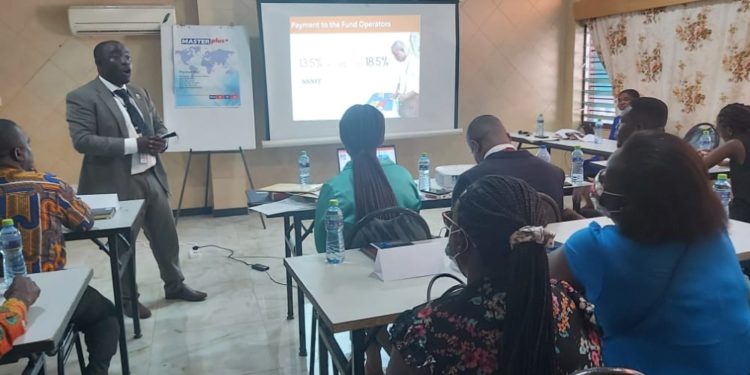A Client Service Officer at the Cape Coast branch of the Social Security and National Insurance Trust (SSNIT), Mr. Daniel Opoku-Agyemang has admonished workers in the informal sector to consciously plan their retirement to avoid early deaths.
He said many who fail to plan properly for retirement and other emergencies were often overtaken by emergencies during or after active service and this hits them hard they may not survive it because of financial frustration.
Mr. Opoku-Agyemang said workers, particularly those within the informal sector must make it a priority to save money towards their retirement to avoid becoming financially frustrated.
Event
He was speaking at a financial literacy program organized by the Journalists for Women and Rural Development in Africa (JWRDA) in collaboration with Hos-Glo Company, a humanity development organization in Cape Coast on Tuesday.
The program was aimed at empowering women in those the informal sector with sets of skills and knowledge that would allow them to make informed and effective decisions with their financial resources.
“I would like to encourage all people especially those in the informal sector and people with businesses to secure their future with a retirement plan.”
He stressed that building a good savings habit must be cultivated by all, be it those in formal employment or informal employment as retirement and other unforeseen circumstances from work were not limited to a targeted group.
The Executive Director for JWRDA, Mrs. Shirley Asiedu-Addo said the association came face to face with the challenge facing Small and Medium Scale Entrepreneurs in their work as journalists and saw the need to roll out the training to help improve the situation.
“We were energized to be a part of the solution and women, in particular, were given the knowledge that would boost their incomes and impact their families.”
Institutionalize informal sector contributions
Participants at the training appealed to relevant stakeholders to put measures in place to ensure that contributions from workers within the informal sector were institutionalized to enable them to see it as an obligation they had to fulfill.
They intimated that those in the informal sector were only enrolled on a voluntary contribution scheme and most workers within that category do not see the need to give it the attention it needs.
A participant at the training, Mr. Ibrahim Abdul Rahman said “we will plead with the government to make SSNIT contribution from those of us in the informal sector compulsory so that we will see the need in doing that.”
“We don’t contribute because we are not under any obligation, but if they make it compulsory, we will do it without hesitation.”
The Chief Executive Officer of Hos-Glo, Ms. Ursula Adadzewa Fynn encouraged participants to keep accurate data of the various happenings and transactions within their business to enable them to have procedures in place to sustain their works.
She said putting in place the necessary records would help properly monitor their progress or others as well as make it easier to seek funding support for their business.
“It is proper to keep records of what you do in your line of business to ensure that you get a good management system to deal with any issue that arises.
She also advised them to adopt healthy customer service care attitudes to increase customers and increase incomes.
At a glance
Twenty skilled workers in the informal sector in the Central region have received training in financial literacy in Cape Coast
Read Also: Memo against anti-LGBTQI activists Bill will fail miserably – Sam George
SOURCE: Edith Mensah, CAPE COAST



























